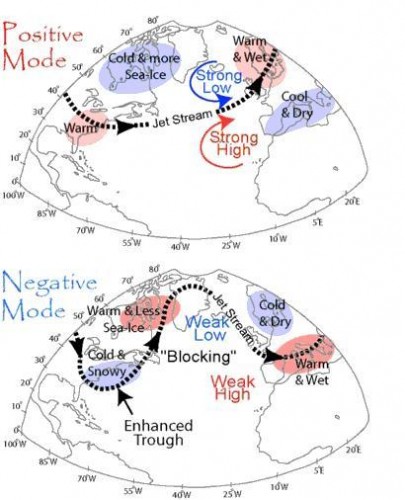Winter does not disprove global climate change. But a lot of people seem to think it does. Then again a lot of people seem to think that because Al Gore is divorcing his wife global warming is not happening. When the truth has nothing to do with Al Gore at all. In fact the truth is a lot of “boring science.” The interesting part (at least to us humans) is what the consequences of global warming are.
One predicted consequence is that global warming = stronger storms, including stronger winter storms.
If you think about it makes perfect sense. Lots of snow happens when you have a lot of moisture in the air, but its still just below freezing. Warmer air holds more moisture, so if you can bump the temps up, even just a degree or two, on average, you are going to get a lot more snow. At first anyway, eventually we will see a lot more rain. Warmer air is not the only thing causing more snow, changes in the temp of the arctic can also cause funky weather patterns.
More info from UCS
It’s Cold and My Car is Buried in Snow. How Can Global Warming be Happening?
On a global scale, the most recent decade (2000-2009) has been declared the warmest decade on record since the 1880’s, when temperatures were first recorded. But the recent snow storms have led to considerable confusion about how record snow relates to our changing climate.
Warming Climate and Ocean EvaporationSnowfall is a combination of the moisture in the atmosphere and air temperature. As the Earth’s temperature warms, the oceans evaporate more water to the atmosphere which produces more precipitation—notably more extreme precipitation—including heavy snowfall when conditions are below freezing.
Contributing FactorsIn the Northeastern United States, there is another major contributing factor to heavy snowfall—a phenomenon known as the North Atlantic Oscillation (NAO). During the positive NAO phase, pressure systems prevent frigid Arctic air from plunging southward. During the negative NAO phase, the pressure weakens and allows the jet stream to buckle and combine cold Arctic air with moisture laden southern air masses typically resulting in more snow.
The winter of 2010 recorded second lowest negative phase of the NAO since the 1970s and helps to explain the record snowfalls across the northeastern United States.
The current 2011 winter is also trending toward strong negative phase.
